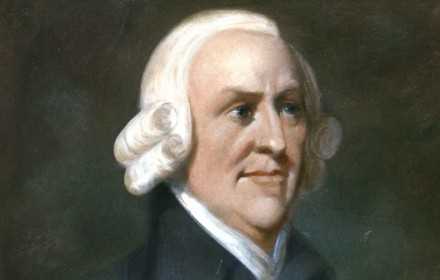well... Adam Smith is known as The Father of Economics.
Adam Smith was a philosopher of18th-century renowned as the father of modern economics, and a major supporter of laissez-faire economic policies.
In his very first book, "The Theory of Moral Sentiments," Smith propounded the idea of the invisible hand—the tendency of free markets to regulate themselves by means of supply and demand, competition, and self-interest.
Smith is also popular for his theory of compensating differentials wage system, meaning to pay higher wages that jobs which tend dangerous or undesirable to attract workers to these positions, but he is mostly known for his book published in 1776 named "An Inquiry into the Nature and Causes of the Wealth of Nations.".
Early Life
.

The Adam Smith's life begins on June 5, 1723, in Scotland
at his baptism. At age 14, he attended the University of Glasgow, later attending the renowned Balliol College at Oxford University. He gave his many years in teaching and tutoring, publishing some of his lectures in his 1759 book.
In 1776 "An Inquiry Into the Nature and Causes of the Wealth of Nations," that matter was well-received and laid the basis for the publication which would ultimately make his place in history.
Adam Smith Creates the Concept of GDP
Through the ideas presented in "The Wealth of Nations," Import/export business was changed by Smith and created the concept of gross domestic product (GDP).
Before the release of "The Wealth of Nations," countries declared their wealth based on the value of their silver deposits and gold. Smith’s work was highly critical of mercantilism, he argued that countries should be evaluated based on their levels of commerce and production.This invent the metric of GDP as it created the basis for measuring nation’s prosperity .
Before this, different countries were hesitant to trade with one another countries, unless it benefited them. However, free exchange should be created Smith argued that, as both sides trading become easy. This led to the countries judging their value accordingly due to increase in imports and exports. Smith also infer for a limited government. Smith did see the government responsible only for some sectors including education and defense.
The Bottom Line
Smith became the foundation of the classical school of economics that ideas became associated with him and gave him a place in history as the father of economics. Smith’s Concepts pioneered, such as the invisible hand and the division of labour serve are now important economic theories. Smith died on July 19, 1790, at age 67 but the ideas he gave us always live on in the form of contemporary economic research and institutes like the Adam Smith Institute. The Bank of England, in 2007, on the £20 note placed his image.
Hope this was Informative!!